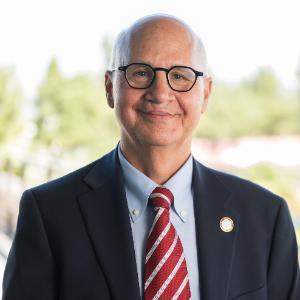| Trouble viewing this email? Read it online. |
| September 10, 2025 |
May the memory of Charlie Kirk’s life always be for a blessing. During these incredibly challenging times, I have been awestruck by the way in which our own law school community has continued to engage in respectful dialogue with each other, even across our many wonderful differences. Together we have fearlessly embraced the dramatic challenges and changes surrounding us, always guided by our enduring Jesuit values of cura personalis, respect for the equal dignity and infinite worth of every human being, genuine curiosity, academic excellence, service to others, the pursuit of justice, and cura futuri–care for our common future. As a giant in tech and intellectual property law in the heart of Silicon Valley, we are leading the world in shaping the law and policy governing rapidly emerging technologies, particularly artificial intelligence. We have enthusiastically, but ethically, approached new technologies like artificial intelligence as powerful professional tools that can promote productive research, constructive collaboration, relational skills, and human flourishing. Throughout our curriculum, pedagogies, assessments, programs, career opportunities, and industry partnerships, we will ensure that our students develop exceptional levels of tech competency while answering the call of Pope Leo XIV to be ever mindful of the “ethical dimension of AI” and the call of Father Arturo Sosa, Superior General of the Society of Jesus, to recognize that “technology must serve humanity’s deeper purpose.” At our inaugural “What I Did This Summer” event, 23 faculty and staff-educators presented posters describing their projects, including their cutting edge scholarship about the appropriate role of generative AI in areas such as legal research and writing, the U.S. digital divide and digital discrimination, ethics and identity in the age of AI, international AI governance, the pedagogy of AI, the practice of law and AI, and the inflection point for education law and policy created by AI. Our faculty and staff-educators also displayed their fascinating research and institutional work regarding asylum and child removal proceedings, sex work and health justice, summer abroad programs in six countries, the International Criminal Court’s appeals process, the pro-social benefits of the Internet, the law of design, mitochondrial replacement techniques for infertility, adolescent medical care post-Roe, copyright law, critical lawyering skills, federal toxics regulation, environmental justice law, policy, and innovation, carbon markets, federal income tax, the constitution’s commerce clause in 2025, Congress’s authority to regulate state and local taxation, California state bar advocacy and education, enrollment and operations service enhancements, the design of hybrid clinics, pre-faculty recruitment, the law for startups through an empathetic lens, parental rights, physical appearance and the constitution, securities fraud, copy trading, civil dispute resolution, and the next revolution in constitutional law. The event was a huge success thanks to the vision and leadership of Associate Dean of Research Eric Goldman; the work of Hope Saena, who designed the stunning posters; Lisa McMahon, Marjorie Short, Alexa Zollin, and Assistant Dean for Advancement, Cheryl Caligaris, who provided event logistics and marketing; and our university colleagues from the Provost’s Office, University Marketing and Communications, and the Miller Center, who showed their strong support. View event recap, photos, and posters here. In that same innovative spirit, the law school last week attracted a record breaking audience of nearly 700 participants from all over the world for its 21st annual Jerry A. Kasner Estate Planning Symposium. The symposium featured a panel “Embracing Innovation and Maintaining Integrity in a Modern Legal Practice,” led by our superstar Professors Laura Norris and Linsey Krolik. The expert panelists explored how law practices are leveraging AI-enabled tools to enhance client services while navigating the ethical challenges these technologies present. Santa Clara Law Professor Pat Cain–a leading estate planning scholar in the country–also joined the symposium to share her expertise about the latest developments in the field. Thanks to the dedicated work of the planning committee, especially committee chair and alum, Chuck Packer ’80, our Advancement & Alumni Relations team (with special thanks to Marjorie Short), our volunteers, our speakers, and our sponsors, this signature event was another great success. I am immensely grateful to each of you for courageously coming together to rise to the challenge of embracing our many seismic challenges and changes—in order to build a more just, humane, and hope-filled future. With warm regards and tremendous gratitude,
Michael J. Kaufman |
| Santa Clara University School of Law | Privacy Policy | Unsubscribe |
|
Santa Clara University School of Law |


